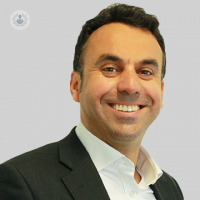Radicular back pain: causes and treatment
Written by:Radicular lumbar pain may feel like shooting pain, numbness and weakness in the affected area. Common causes of such pain may include a herniated disc or osteoarthritis. If your back pain has persisted for more than six weeks, it might be time to see a specialist. In this article, we asked one of our top neurosurgeons Mr Ahmed-Ramadan Sadek for his expert advice on managing radicular back pain.

What is radicular back pain?
Radicular back pain is a pain that occurs in a specific region or distribution as a consequence of a single nerve root that is compressed or inflamed. It can occur anywhere in the spine.
What symptoms accompany radicular pain?
In addition to pain, there can be loss of sensation or pins and needles in the region that is normally supplied by that nerve. Fortunately, muscle strength is often preserved in patients with radiculopathy because muscles often receive innervation from multiple nerve roots. Muscle strength is only effected in severe cases of radiculopathy.
What causes radicular pain?
The commonest cause of radicular pain in both the arms and legs is as a result of a herniated disc or osteoarthritis in and around the region in which that specific nerve root exits the spinal canal. Less frequently, it can be the result of inflammation, infection, a tumour or a traumatic injury to the vertebra that make up the spinal column.
Can radicular pain go away by itself?
Fortunately, in the vast majority of cases with time, the symptoms are self-limiting. However, if symptoms persist for more than six weeks, they can often become chronic and require further investigation and treatment.
How is radicular pain treated?
In the first instance, symptomatic treatment is the goal. Often reducing the pain can have significant effects on quality of life and can help the sufferer return to normal function. As the vast majority of cases can be self-limiting, embarking on a physiotherapy-led exercise program can significantly improve symptoms and help provide the sufferer with the knowledge of how to improve their core strength and posture.
If the pain does not respond to simple pain killers it is possible to prescribe specific drugs, which act specifically on the signals transmitted by nerves to reduce the perception of pain. These are often very effective and can provide long-term relief.
If these treatments do not work, prior to embarking on surgery to relieve the pressure around the nerve, we can use a steroid and local anaesthetic injection to confirm that a particular nerve root is causing the pain. After this, we can perform a keyhole procedure to take the pressure off the nerve which should give permanent relief.
If you would like Mr Sadek’s expert help in relieving your back pain, you can book an appointment with him via his Top Doctor’s profile here.


